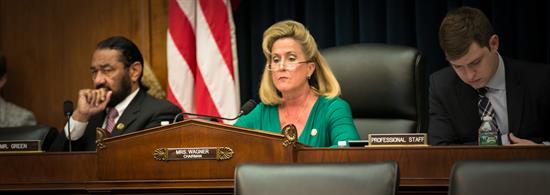Oversight Subcommittee Examines Unconstitutional Structure of the CFPB
Washington,
March 21, 2017
The Oversight and Investigations Subcommittee held a hearing on Tuesday to examine how the structure of the Consumer Financial Protection Bureau (CFPB) violates the Constitution. The subcommittee also discussed possible changes to the Bureau that would make it constitutional and accountable to the American people. “Created under the Obama-era, 'Washington knows best' mindset, the CFPB is an unconstitutional behemoth that side-steps accountability to Congress and the President. With an imperial Director, the CFPB continually expands and overreaches its regulatory authority at the expense of American families who are desperate for economic relief. It is time we hold Director Cordray responsible and restructure the CFPB within the framework of our Constitution,” said subcommittee Chairman Ann Wagner (R-MO). Key Takeaways from the Hearing:
Topline Witness Quotes: “More than any other administrative agency ever created by Congress, the CFPB is far outside of our constitutional structure, holds the potential for tyrannical governance, and obscures the lines of governmental accountability.” – The Honorable Theodore Olson, Partner, Gibson, Dunn & Crutcher LLP “As Judge Brett Kavanaugh noted in the D.C. Circuit, the Director is the second most powerful officer in the government for he serves under no one’s supervision, enjoys a vast budget not subject to the appropriations process, and exerts enormous influence over several prominent aspects of the economy….The problem with the CFPB is that if it is constitutional, it is ‘open season’ on the Constitution’s chief executive, for Congress may create an even more powerful ersatz one. For all intents and purposes, Dodd-Frank creates a statutory chief executive, a mini-President over consumer financial products.” – Professor Saikrishna Prakash, James Monroe Distinguished Professor, University of Virginia School of Law “These issues are profoundly important, and not just because of any particular policies that the CFPB might formulate now or in the future. If Congress and the courts allow the CFPB’s original structure to remain intact, then it will become the new benchmark for the next generation of ‘independent agencies.’ The current benchmark—the multi member commission model pioneered in the late 19th century and entrenched during the Progressive Era and the New Deal—is not without faults of its own, but it has come to serve a reliable and worthy purpose in modern administration, while remaining accountable to Congress. I urge you not to allow that history to be discarded in favor of a new form of ‘independent’ agency that enjoys not only a measure independence from the President, but also ‘full independence’ from Congress, as the CFPB has repeatedly boasted. No matter what the courts ultimately do on these issues, Congress itself ought to reform the CFPB in order to restore constitutional accountability to this unprecedented, unconstitutional agency.” – Adam White, Research Fellow, Hoover Institution ### |


